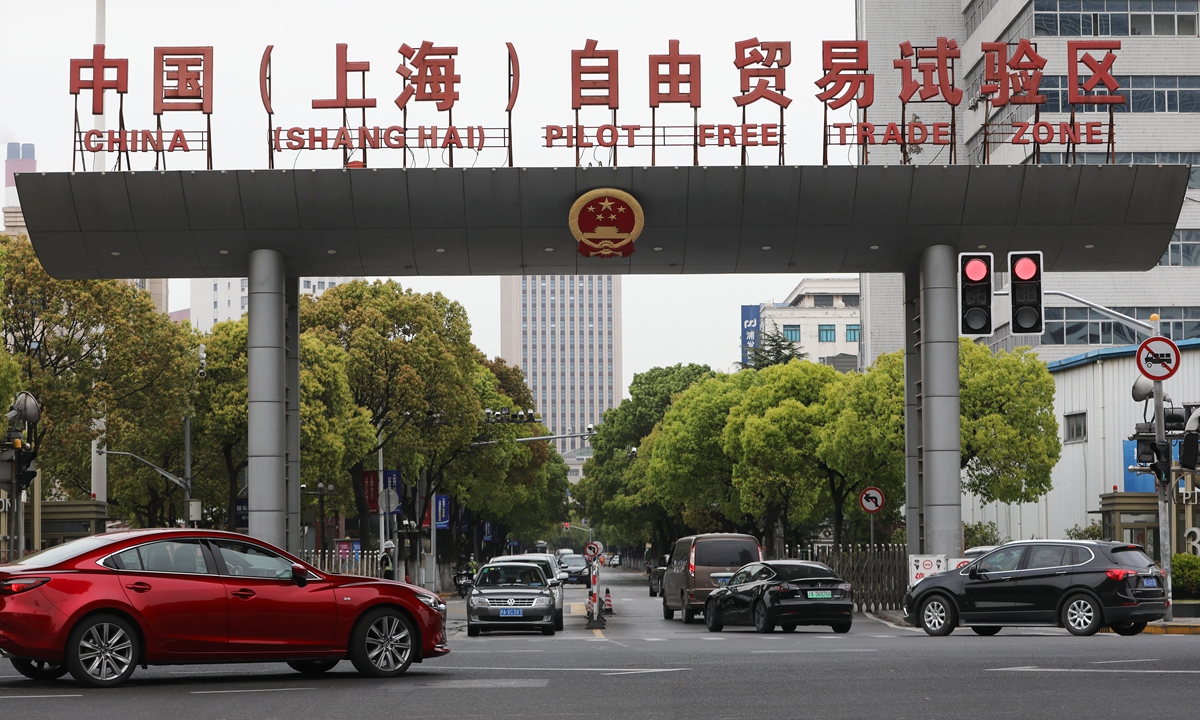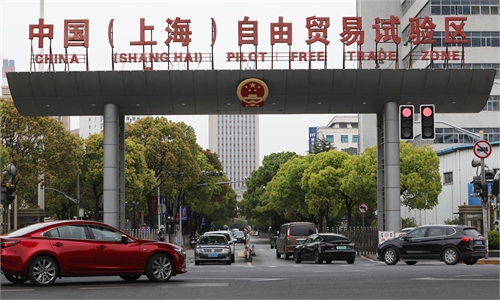
The main entrance of the China (Shanghai) Pilot Free Trade Zone located in the Pudong New Area Photo: Yang Hui/GT
China will further pursue high-level opening-up in the services sector and will shorten the negative list for investment in the country's free trade zones (FTZs). The country will also strive to roll out a negative list for cross border services trade, a vice minister of the Ministry of Commerce said on Wednesday.
"At present, the negative list for foreign investment access in the pilot FTZs has been cleared for the manufacturing industry, and the focus next will be on promoting the opening-up of the services industry," Vice Minister of Commerce Sheng Qiuping told a press conference at the State Council Information Office on Wednesday.
"We will work with relevant departments to conduct in-depth research and promote the rational shortening of the negative list for foreign investment in the pilot FTZs. Meanwhile, we will promote the introduction of a negative list for cross-border services trade and lead the country's continued opening-up," Sheng said.
On Tuesday, a seminar was held in Beijing to mark the 10th anniversary of the establishment of China's first pilot FTZ.
China's top leaders have recently delivered instructions on advancing the development of pilot FTZs, calling for higher-level pilot FTZs and enabling the pilot FTZs to play an exemplary role.
China should pursue high-level opening-up with institutional innovation at the core, coordinate development and security, align domestic rules with international economic and trade rules, further promote institutional opening-up, strengthen overall planning and systematic integration of reform, and promote innovative development of the entire industrial chain, according to the instructions.
Tu Xinquan, dean of the China Institute for WTO Studies at the University of International Business and Economics in Beijing, told the Global Times that China's FTZs have made great progress in the past decade but further improvement and breakthroughs are needed.
"The further opening-up of the services sector will be a major area to work with," Tu said. "Due to the nature of services, there would be better results if all FTZs could implement new and innovative opening-up measures in services simultaneously, under coordinated orchestration by the central government."
Experts said that as China is preparing to join high-level international agreements such as the Comprehensive and Progressive Agreement for Trans-Pacific Partnership (CPTPP), further liberalizing the services trade and investment will be productive.
Li Yong, a senior research fellow at the China Association of International Trade, told the Global Times on Wednesday said that it is important that the experience from the FTZs should be a template for other areas in the country.
Over the past decade, each pilot FTZ has made many iconic and groundbreaking achievements in institutional innovation, playing the role of comprehensive experimental platforms for reform and opening-up, according to officials at Wednesday's press conference.
China has 21 pilot FTZs. While they occupy less than 0.4 percent of China's land area, they attracted 18.1 percent of total foreign investment and contributed 17.9 percent of the country's total foreign trade in 2022. In the first half of 2023, the ratios were further increased to 18.4 percent and 18.6 percent, respectively.
The China (Shanghai) Pilot Free Trade Zone (FTZ), the inaugural pilot FTZ in China, has seen an increasing number of newly established firms and an improving business environment over the past decade, according to a white paper released Wednesday. The zone had attracted 84,000 new enterprises by the end of 2022.
In the first eight months of this year, the foreign trade volume in the China (Guangdong) Pilot Free Trade Zone grew by 17 percent year-on-year to 341.18 billion yuan ($46.67 billion), state broadcaster CCTV reported on Wednesday. The growth rate was way higher than the province's foreign trade growth, which came in at 0.2 percent during the period.



